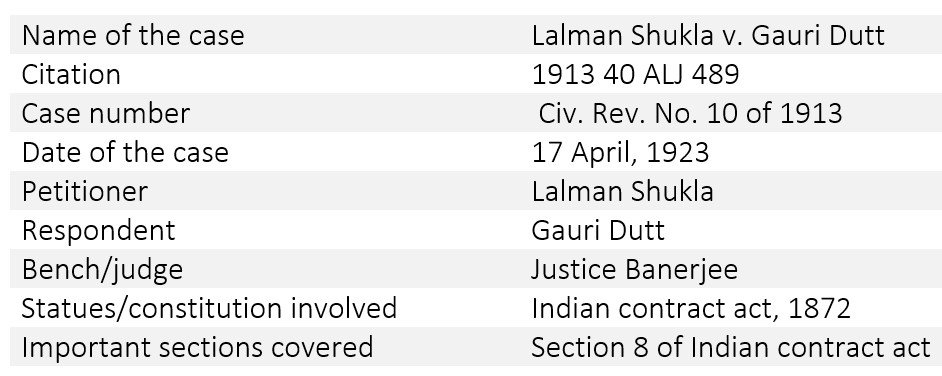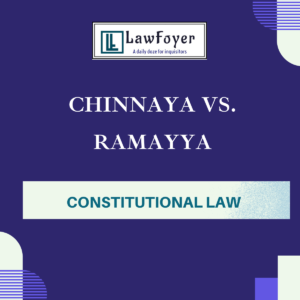By:- Kamakshi Agrawal
In Allahabad high court

INTRODUCTION :
A contract is a legal document between two or more parties. Basically, the contract is the basis of all financial transactions in day to day life, knowingly or unknowingly we all enter into a contract on daily basis.
In India, the contracts are governed under the Indian contract Act of 1872. This article contains the case related to the validity of the contract in respect to section 8 of the contract Act. This case was between Lalman Shukla, the plaintiff and Gauri Dutt, the defendant.
FACTS OF THE CASE:
In this case, the nephew of the defendant departed from his house secretly without informing anyone and no one was able to find him, so the defendant i.e. Gauri Dutt decided to sent his servants to different places in search of his nephew. For their travelling expenses, the defendant handed them some money. The plaintiff who was also the servant went to Haridwar.
Since for a long time his nephew was not found, therefore the defendant announced a reward of Rs. 501 to anyone who will find his nephew.
In some days the plaintiff found the nephew in Rishikesh and brought him home. The defendant awarded the servant with two sovereigns in Haridwar and Rs. 20 when he returned. After 6 months, the defendant removed his servant due to some disputes. Thereafter, the plaintiff claimed Rs. 499 as the reward for finding his nephew was not given to him.
ISSUES RAISED:
The plaintiff’s request was first rejected in lower court then he filed a sue in the Allahabad high court.
The issues discussed in the case were as follows:
- Is this situation makes a valid contract?
- Whether the claimed reward of Rs. 499 be provided or not?
- Whether the decision marked by the lower court is justified?
- What kind of offer is the plaintiff claiming for?
ARGUMENT OF PLAINTIFF:
- He argued that he had performed his part which makes him valid to claim for the reward and the defendant should imply acceptance to general offer made by him.
- He referred to section 8 of the Indian contract act,1872, which states that the performance of the condition of a proposal is an acceptance of the proposal. In his case, the condition was who so ever will find the missing nephew will be awarded the promised amount, hence the plaintiff is entitled to claim for the reward.
RELATED PROVISIONS:
This case includes certain laws and concepts which are mentioned below:
- Section 2(a) of the Indian contract act,1872 states that “when one person signifies to another his willingness to do or to abstain from doing anything, with a view to obtaining the assent of that other to such act, he is said to make a proposal”
- Section 2(b) gives the definition of promise which states that “when the person to whom the proposal is made signifies his assent thereto, the proposal is said to be accepted. A proposal when accepted, becomes a promise.”
- Section 2(h) states that “an agreement enforceable by law of contracts.”
- Section 3 of the Indian contract act states that “the proposal must be communicated to the person who is expected to accept the offer.”
- Section 8 of the Indian contract act,1872, states that “performance of the conditions of a proposal, or the acceptance of any consideration for a reciprocal promise which may be offered with a proposal, in an acceptance of the proposal.”
CASE LAWS USED DURING THE ARGUMENTS:
- Gibbons v. Proctor: This case was used by the plaintiff, where the superintendent of police announced a reward who will help in providing information to him regarding criminal. So, in this case, one police officer who provided some useful evidence was not knowing about the reward initially but later when he came to know he claimed his reward and the court also decided that he should be provided.
- Williams v. Carwardine: In this case also the plaintiff was marked that the knowledge of general offer is not necessary for the acceptance of the contract.
- Fitch v. Snedeker: this case was used by the defendant, where the plaintiff was Fitch who helped the governor in providing evidence regarding a murder that too unknowingly about the reward. Later when he filed a suit for claiming his reward, the court also mentioned that there can be no acceptance without the knowledge of the offer.
JUDGEMENT:
The decision held by Allahabad high court was that the basic requirement for acceptance of the offer is having its knowledge and assent to convert a proposal into an enforceable agreement.
In the present case the plaintiff was not knowing about any offer when he went to Haridwar in search of his master’s nephew also it was done as a part of his duty to serve his master in all manners. There was no consideration by the plaintiff for which he can claim for the reward. Therefore the appeal was dismissed and court announced that the plaintiff is no one to claim for the reward in this case.
CONCLUSION:
From this case study, we can conclude that general offers are those which are made to the public, not to any single individual. The judgement clarified one main thing that the acceptance cannot be made by the plaintiff without his knowledge about the offer. So in this case the offeror lacked acceptance and communication and hence was not entitled to the reward In return.
REFERENCES:
- https://www.casemine.com/judgement/in/5ac5e3204a93261a1a736d1f
- https://www.ourlegalworld.com/lalman-shukla-v-gauri-dutt-case-analysis-our-legal-world/
- Gibbons v. Proctor, [1892] 64 LT 594
- Williams v. Carwardine, [1833] EWHC KB J44
- Fitch v. Snedkar, [1868] 38 N.Y. 248

